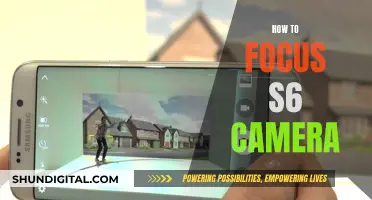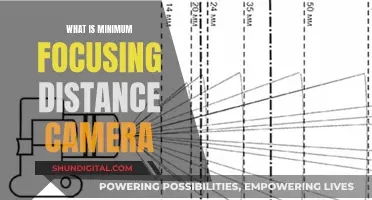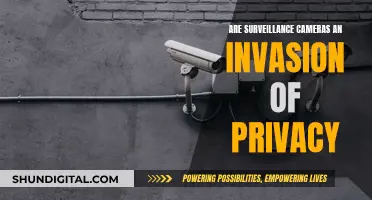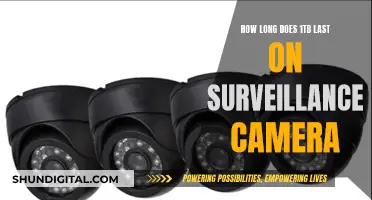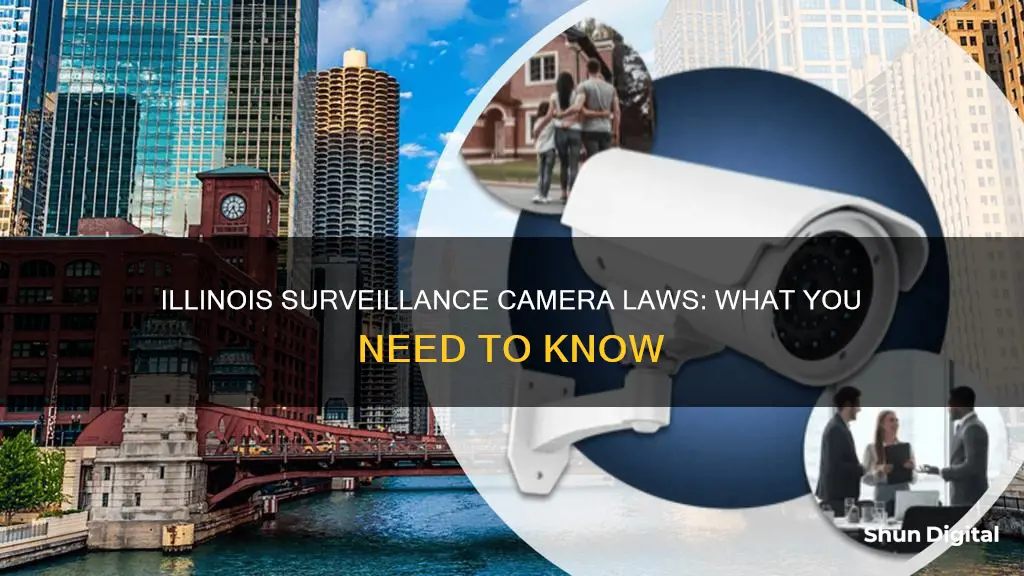
Surveillance laws in Illinois are complex and often misunderstood. While security cameras can be a great deterrent to criminal activity, it's important to understand the legal implications of their use. In Illinois, the law prohibits recording another person in their residence without their consent, and this extends to audio recordings as well. However, there is no expectation of privacy in public spaces, so capturing a neighbour's front yard, for instance, is generally permissible. The state has also banned facial recognition technology without consent, and there are strict laws around recording private conversations.
What You'll Learn
- Illinois law permits recording someone secretly if a crime is expected to be committed against you or your household
- In Illinois, it is illegal to record inside someone's residence without their consent
- Illinois has banned facial recognition technology without consent
- Illinois wiretapping laws allow recording audio in public places if the camera is visible
- Illinois law permits recording inside your own home, except in places where guests have a reasonable expectation of privacy

Illinois law permits recording someone secretly if a crime is expected to be committed against you or your household
Illinois law permits the secret recording of another person if a crime is expected to be committed against you or your household. This is an exception to the state's two-party consent law, which requires the consent of all parties to record private conversations. The secret recording exception allows residents to collect evidence of a crime without the consent of the other party.
Illinois law distinguishes between audio and video recordings. Audio recordings are subject to stricter regulations than video recordings. For example, it is illegal to record audio in a public place without the consent of all parties involved. However, video recordings in public places are permitted without consent as long as there is no reasonable expectation of privacy.
In Illinois, it is always illegal to record audio or video in certain locations, such as restrooms, locker rooms, and hotel rooms. Additionally, it is illegal to record inside a person's residence without their consent, regardless of whether the recording is made from inside or outside the residence.
It is important to note that while secret recordings may be permitted in certain circumstances, there are still risks involved. For example, if the recording is discovered, it could be argued that the person's reasonable expectation of privacy was violated, which could result in legal consequences. Therefore, it is always advisable to consult a lawyer before engaging in any secret recording.
Overall, Illinois law allows for the secret recording of another person if there is a reasonable expectation that a crime will be committed against oneself or one's household. This exception to the two-party consent law enables residents to gather evidence of criminal activity without the consent of the other party. However, it is important to be aware of the specific regulations regarding audio and video recordings and to understand the potential risks involved.
Batch Processing Power: Copying Adjustments in Camera Raw
You may want to see also

In Illinois, it is illegal to record inside someone's residence without their consent
Surveillance laws in Illinois are complex, and it is important to understand the nuances of the law. In Illinois, it is illegal to record inside someone's residence without their consent. This is outlined in the state's surveillance laws, which state that it is unlawful to "knowingly make a video record or transmit live video of another person in that other person's residence without that person's consent".
The law takes into account the reasonable expectation of privacy that individuals have within their own homes. This means that recording someone inside their home through a window is illegal. However, it is important to note that this does not extend to the entire plot of land; viewing or recording a neighbour's yard or property is generally permitted as these areas are in plain view and do not carry the same expectation of privacy.
The law also prohibits recording in certain private areas, such as restrooms, locker rooms, or fitting rooms, regardless of location. Additionally, recording through or underneath someone's clothing is not allowed.
It is worth noting that there are exceptions to the law. For instance, if you have a reasonable expectation that a crime is about to be committed against you or someone in your household, you may be permitted to record secretly.
Illinois also has specific laws regarding audio recording. Federal and state wiretap statutes restrict the ability to monitor and record conversations, even in one's own home. Generally, it is illegal to record a conversation without the permission of at least one participant. However, if you are a participant in the conversation, your consent to being recorded may be implied, and the recording may not violate wiretapping laws.
It is important for residents to be aware of these laws and to respect the privacy of their neighbours and guests. Failure to comply with these laws can result in criminal charges and civil lawsuits.
Charging Your Nikon: A Quick Guide to Powering Up Your Camera 3700
You may want to see also

Illinois has banned facial recognition technology without consent
Illinois has some of the toughest privacy laws in the United States. The state has banned the use of facial recognition technology without prior consent. This law, called the Biometric Information Privacy Act (BIPA), was enacted in October 2008. BIPA makes it illegal for private companies and institutions to collect, use, or sell biometric data, including facial geometry, fingerprints, palms, eyes, and voice, without the individual's written consent.
The law requires companies to obtain written consent from individuals before collecting or using their biometric data and to provide a written policy outlining the purpose and duration of data collection. The policy must be available to the public, and the data must be permanently destroyed once the purpose for collection has been satisfied or within three years of the individual's last interaction with the company, whichever comes first.
Illinois' law also prohibits the profiting, trading, or disclosure of biometric data without consent. Companies are allowed to disseminate data only under specific conditions, such as with the individual's consent, to complete a financial transaction, or as required by law.
The state has taken a strong stance against the unrestricted use of biometric technology, and its citizens can sue for alleged violations, leading to legal battles with some of the world's largest companies. This has sparked debates about the balance between privacy and technological advancement, with privacy advocates warning that the growth of tracking technologies has outpaced existing laws in most states, leaving individuals vulnerable to identity theft and invasion of privacy.
The Evolution of Camera Phones: First Snapshot
You may want to see also

Illinois wiretapping laws allow recording audio in public places if the camera is visible
Illinois wiretapping laws are complex and have evolved over time. While the state previously required recordings to be legal, all parties had to consent. However, this was deemed unconstitutional in 2014, and now the law is more nuanced.
Illinois wiretapping laws allow recording audio in public places as long as the recording device is visible. This means that as long as you are openly recording others in public spaces, you are generally permitted to do so without their consent. However, it is important to note that there are still specific places where recording is prohibited, such as in restrooms, locker rooms, or inside someone's residence.
The legality of recording in public places also depends on whether there is a reasonable expectation of privacy. For example, recording someone through or underneath their clothing without their consent is illegal. Additionally, recording someone secretly is only permitted if you have a reasonable expectation that a crime is about to be committed against you or someone in your household.
It's worth noting that Illinois has banned facial recognition technology without consent, and there are strict laws governing the use of security cameras and audio recording devices in the workplace. Employers must have legitimate reasons for using video monitoring and must inform employees about the presence of security cameras and their video storage and reviewing policies.
Overall, while Illinois wiretapping laws allow recording audio in public places with a visible camera, it's important to be mindful of the specific restrictions and exceptions to ensure compliance with the law.
Focusing Techniques for Sharp Landscape Photography
You may want to see also

Illinois law permits recording inside your own home, except in places where guests have a reasonable expectation of privacy
Illinois law permits the recording of video and audio inside your own home, but not in places where guests have a reasonable expectation of privacy, such as a restroom, locker room, or hotel bedroom. This is outlined in 720 ILCS 5/26-4(a).
The law also prohibits the recording of video or audio inside another person's residence without their consent, as per 720 ILCS 5/26-4(a-5). This includes recording from outside the residence using a device that transmits from a remote location, as per 720 ILCS 5/26-4(a-6).
In addition, Illinois law prohibits the recording of video or audio in certain public places, such as a tanning bed, tanning salon, or changing room, without the consent of all parties involved. This is also outlined in 720 ILCS 5/26-4(a).
It is important to note that Illinois is a two-party consent state, meaning that it is a criminal offense to record communications without the consent of all parties involved. However, the Illinois Supreme Court amended the law in 2014 to allow recording in areas where there is no reasonable expectation of privacy, bringing it more in line with one-party consent states.
The law also makes it a felony to intercept or record any private telephone or electronic communication without the consent of all parties, as per 720 Ill. Compiled Stat. 5/14-1, -2.
Overall, while Illinois law permits recording inside your own home, it is important to respect the privacy of guests and obtain consent in situations where there is a reasonable expectation of privacy.
Charging Yi 4K Action Camera: A Step-by-Step Guide
You may want to see also
Frequently asked questions
No, you cannot record your neighbours in their residence without their consent. However, you can record their front yard, as this is in plain view and there is no reasonable expectation of privacy.
Yes, you can record audio in Illinois as long as the recording device is not hidden. However, federal and state wiretap laws restrict your ability to record conversations, even in your own home.
Yes, you can record people in your home in Illinois, but guests and workers have a reasonable expectation of privacy in certain places, such as the bathroom.
Yes, you can record yourself in Illinois, but be aware of where you are and what you are doing. For example, if you are in a public place, you may be recording others without their consent.
Yes, you can record a crime in Illinois, but be aware that you may need to provide the footage to the police as evidence. It is also important to only record the crime itself and not to continue recording after the fact, as this could be an invasion of privacy.



